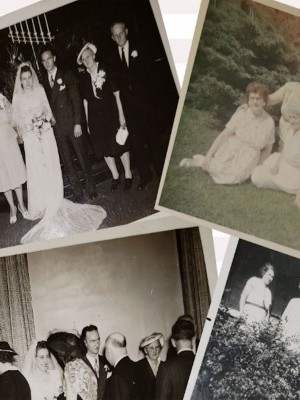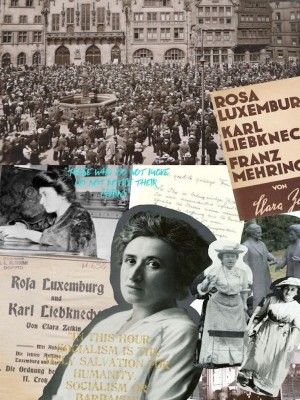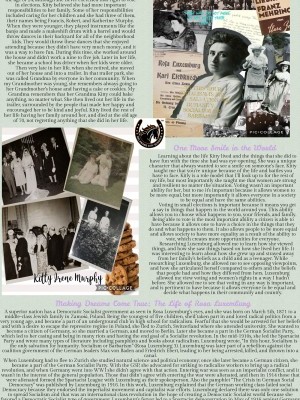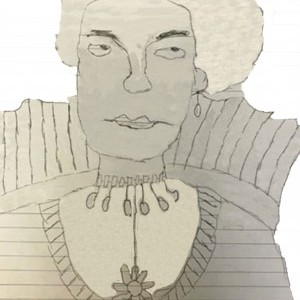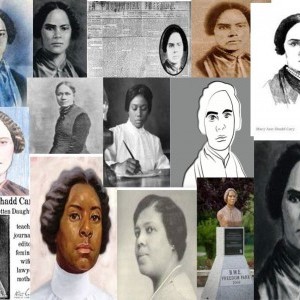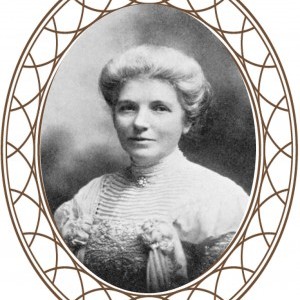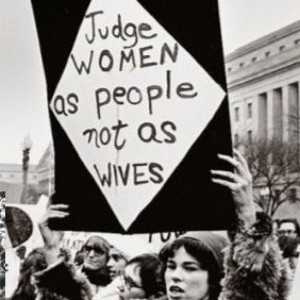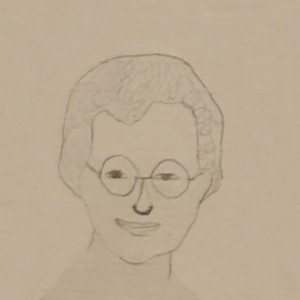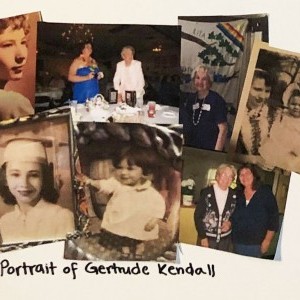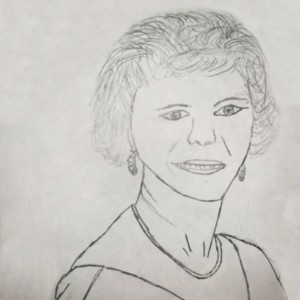Madison Decker
Rutherford B. Hayes High School | Delaware City, OH | 10th Grade
Inspirational Family Member
Kitty Irene Murphy - A Well-Lived Life
The smell of baked goods, and a smile on everyone's face is what runs through my great-great-grandmother’s home. It started with my great-great-grandmother named Kitty Irene Slack, the eldest of six children. When she was young, she lost her mom and took her place, since she was the oldest. Being the matriarch, she didn't get to play with the other children, and wasn't able to run around and play with friends when she was younger. Although while she helped with her siblings, her father shot horses to provide the family with money. When she married at the young age of 18, Kitty didn't have a regular job; she was a housekeeper and cleaned homes.
In 1915, she married Jack Murphy and became Kitty Irene Murphy. Then she was given the ability to vote when she reached the age of 24, although she never exercised that right to vote in elections. Kitty believed she had more important responsibilities to her family. Some of her responsibilities included caring for her children and she had three of them, their names being Francis, Robert, and Katherine Murphy. When they were younger, they played instruments like the banjo and made a makeshift drum with a barrel and would throw dances in their backyard for all of the neighborhood kids. They would throw these dances that she enjoyed attending because they didn't have very much money, and it was a way to have fun. During this time, she worked around the house and didn't work a nine-to-five job.
Later in her life, she became a school bus driver when her kids were older. Then very late in her life, when she retired, she moved out of her house and into a trailer. In that trailer park, she was called Grandma by everyone in her community. When my Grandmother was young, she remembers always going to her Grandmother's house and having a cake or cookies. My Grandma remembers that her Grandma Kitty could bake anything, no matter what. She then lived out her life in the trailer, surrounded by the people that made her happy and encouraged her to be kind and joyful. Kitty lived the rest of her life having her family around her, and died at the old age of 70, not regretting anything that she did in her life.
Historical Figure I Admire
Making Dreams Come True: The Life of Rosa Luxemburg
A superior nation has a Democratic Socialist government as seen in Rosa Luxemburg’s eyes, and she was born on March 5th, 1871 to a middle-class Jewish family in Zamość, Poland. Being the youngest of five children, she’d taken part in and loved radical politics from a very young age, and became a part of an underground club in high school for radicalism. Fearful that she would be arrested for her beliefs and with a desire to escape the repressive regime in Poland, she fled to Zurich, Switzerland where she attended university. She wanted to become a citizen of Germany, so she married a German, and moved to Berlin. Later she became a part of the German Socialist Party, which led to her casing and being in many riots and having the end goal of a Socialist revolution. In the mid-1910s, she led the Spartacist Party and wrote many types of literature including pamphlets and books about radicalism. Luxemburg wrote, “In this hour, Socialism is the only salvation for humanity. Socialism or Barbarism” (Rosa Luxemburg 3). Luxemburg was later part of a rebellion against the coalition government of the German leaders Max von Baden and Friedrich Ebert, leading to her being arrested, killed, and thrown into a canal.
When Luxemburg had to flee to Zurich, she studied natural science and political economy; once she later became a German citizen, she became a part of the German Socialist Party. With the GSP, she advocated for striking to radicalize workers to bring up a radical revolution, and when Germany went into WWI she didn't agree with that action. Entering war was seen as an imperialist conflict, and it wasn't in the interest of the general population. Those that didn’t agree with entering the war were alienated, and then in 1914, those that were alienated formed the Spartacist League with Luxemburg as their spokesperson. Also the pamphlet "The Crisis in German Social Democracy" was published by Luxemburg in 1916. In this work, Luxemburg explained that the German working class failed social Democracy because they endorsed the imperialist movement and capitalist war efforts. Luxemburg declared there was only one solution to spread Socialism and that was an international class revolution in the hope of creating a Democratic Socialist world because she favored a Democratic Socialist type of government. Luxemburg’s fervor led to a Spartacist demonstration, in May of 1916, against Germany entering WWI, and to her arrest for the remainder of WWI. That then led her later to transform the Spartacist League into the Communist Party of Germany, and in January of 1917, she joined a rebellion in Berlin. Many were rebelling against Max von Baden and Friedrich Ebert, who were a part of the Social Democratic party. Before Luxemburg took action, she was hoping her followers wouldn’t take part in the rebellion, but they did and the rebels launched their own attack on January 10. Baden and Ebert then called on their army to slow down the rebellion and Luxemburg was caught with Liebknecht, who was her partner, who both later happened to be captured and killed. Then, Luxemburg was thrown into a canal by an unknown assailant and was found five months later.
Part of Luxemburg's legacy was that she was one of the few that earned a doctorate in Natural Science and Political Economy in the early 1900s, which is an encouragement for people that they can go far and wherever they want to. Her pro-Marxist publishings were a reason that Socialism spread so fast throughout the 20th Century, according to a student at the Ohio State University with the first name of August. On top of that, she helped form five political parties including The Proletariat Party, The Social Democratic Party of Poland and Lithuania, The Social Democratic Party, The Independent Social Democratic Party, and The Communist Party of Germany. Luxemburg refused to go against her own beliefs, and if people didn't like them, she would form another political party. She is most remembered for her ability to see the power of support for political causes all around the world, and she has a street named after her in Berlin. Even though she wasn't able to spread socialism everywhere, it's in place today in Poland which is her home. On top of that, she published many of her ideas in books that include Reform or Revolution; The Accumulation of the Capital; The Mass Strike; The Russian Revolution; and more.
What the Project Means to Me
Learning about the life Kitty lived, and the things that she did to have fun with the time she had was eye-opening. She was a unique character that always wanted to see a smile on someone's face. Kitty taught me that you’re unique because of the life and battles you have to face. Kitty is a role model that I’ll look up to for the rest of my life, but most importantly she taught me that women are strong and resilient no matter the situation. Voting wasn't an important ability for her, but to me it's important because it allows women to be more equal, but more importantly it allows everyone in a society to be equal and have the same abilities.
Voting in small elections is important because it means you get a say in things that happen in the world around you. This ability allows you to choose what happens to you, your friends, and family. Being able to vote is the most important ability a citizen is able to have because it allows one to have a choice in the things that they do and what happens to them. It also allows people to be more equal and allows society to have more equality as a result of the ability to vote, which creates more opportunities for everyone.
Researching Rosa Luxemburg allowed me to learn how she viewed things, and how she saw things based on how she lived her life. It was interesting to learn about how she grew up and strayed away from her family's beliefs as a child and as a teenager. While researching Luxemburg, she allowed me to see opposing viewpoints, and how she articulated herself compared to others and the beliefs that people had and how they differed from hers. Luxemburg allowed me to view voting and women’s rights in a way I hadn’t before. She allowed me to see that voting in any way is important, and is pertinent to have because it allows everyone to be equal and decide what happens in their community and country.
Explore the Archive
More From This Class
Click on the thumbnails below to view each student's work.Deadline Extended
There's still time to join Women Leading the Way.
Become a part of our storytelling archive. Enroll your class today.
Join the Project

